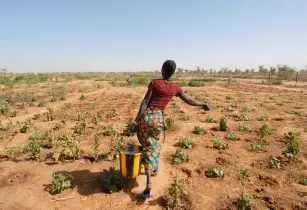On 16 December, a US$50mn International Development Association (IDA) additional financing was approved under the second phase of the West Africa regional Food Systems Resilience Programme (FSRP-2)
The objective is to support the country’s preparedness against food insecurity and improve the resilience of its food systems. An additional 516,700 people in Sierra Leone will benefit from the funding.
“In Sierra Leone, the food and nutrition insecurity situation has been exacerbated by the recent flooding and requires a serious and scaled-up response. This Additional Financing is a strong vehicle to address both immediate needs to mitigate the impact of the ongoing food security crisis, as well as invest in productive capacities and critical infrastructure to strengthen the longer-term resilience of vulnerable populations to more frequent and severe economic and climate shocks,” said Abdu Muwonge, World Bank country manager for Sierra Leone.
Agriculture is the engine of economic growth and poverty alleviation in Sierra Leone, but it is characterised by low and stagnating productivity in key crops, limited market-oriented diversification, major aggregation and coordination bottlenecks, a weak private sector, and a low-capacity public sector. Short-term interventions under the project will help address the immediate impact of food insecurity through cash transfers to vulnerable and food insecure agricultural households to help them cope with the cumulative impacts of production shocks. Additionally, the project will promote activities that close gender gaps in women’s participation in the agriculture sector and will provide access to productive resources for women.
This additional financing brings the total IDA amount provided for the FSRP programme in the region to US$695mn, covering Burkina Faso, Chad, Ghana, Mali, Niger, Sierra Leone, and Togo, as well as three regional organisations: the Economic Community of West African States (ECOWAS), the Permanent Interstate Committee for Drought Control in the Sahel (CILSS), and the West and Central Africa Council for Agriculture Research and Development (CORAF).
“It is good to see countries and institutions come together to implement this broad programme that will simultaneously increase agricultural productivity through climate-smart agriculture, promote intraregional value chains and trade, and build regional capacity to manage agricultural risks,” said Boutheina Guermazi, World Bank director for Regional Integration for Sub-Saharan Africa, the Middle East, and North Africa.





